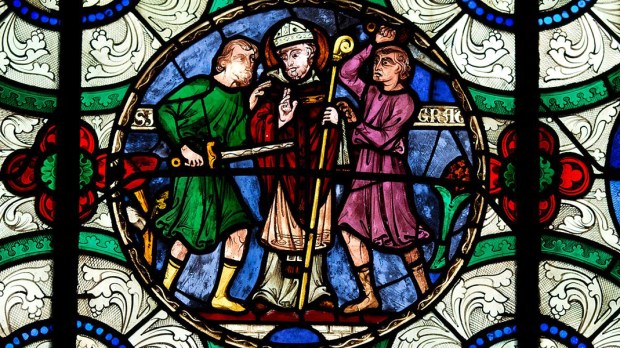Lenten Campaign 2025
This content is free of charge, as are all our articles.
Support us with a donation that is tax-deductible and enable us to continue to reach millions of readers.
Tantalizing clues have emerged that may add to the story of the martyrdom of St. Thomas Becket, killed in Canterbury Cathedral on this day 850 years ago.
A librarian affiliated with Cambridge University believes he has identified a small book that St. Thomas possessed and may have been holding when he was murdered by knights of King Henry II.
The ins and outs of the finding are detailed in a BBC article. When St. Thomas was on the run from King Henry in 1164 and was about to escape to France, he asked an assistant to fetch a treasured book from his residence in Canterbury. Early chronicles do not identify the book.
But in a chance encounter one day in 2014, Christopher de Hamel, then librarian at Corpus Christi College at the University of Cambridge, realized that one of the manuscripts in the college’s Parker Library was directly related to an item listed by the monks of Canterbury Cathedral in 1321: “a binding with the psalter of St. Thomas, bound in silver gilt, decorated with jewels.”
De Hamel pulled out a 1,000-year-old book of the Psalms, which contained a note added to one of its final pages about 500 years ago: “This psalter, in boards of silver-gilt and decorated with jewels was once that of N, archbishop of Canterbury [and] eventually came into the hand of Thomas Becket, late archbishop of Canterbury, as is recorded in the old inscription.”
Scholars had believed that the note’s attribution of the psalter to St. Thomas Becket was a fiction from Elizabethan times. After all, there was no mention of it in an earlier inventory. But de Hamel believes that is because the book was so special that it might have been kept on an altar dedicated to the martyr, which was destroyed during Henry VIII’s reign. The note’s reference to “the old inscription” was probably the original description written by earlier monks, long faded.
“And as Henry VIII had ordered the obliteration of the cult of St. Thomas of Canterbury not long before, it was understandable that the reference to ‘St. Thomas’ had been changed to ‘Thomas Becket, late archbishop of Canterbury,’” the BBC explained. “Here was a book, de Hamel now felt, that was surely a lost holy relic of the Middle Ages. “
Another puzzle
But the note contained another puzzle: who was “N,” the predecessor of St. Thomas? There was an Archbishop Nothelm in the 8th century, but he would have predated the manuscript, which de Hamel believes is no older than 1,000 years.
The only other explanation was that the note referred to Archbishop Alphege, whose name was also spelled Aelfheah. The medieval letter Æ (AE) was probably mistaken by the Elizabethan copyist as an N — in some older manuscripts they can look very similar, de Hamel reasoned.
St. Alphege, it turns out, was killed by Danes at Greenwich in the year 1012. He was canonized in 1078.
Alphege is recorded as joyfully reciting the psalms while in Danish captivity. Could it be, de Hamel asks, that he was holding this book when martyred? That would certainly have made it a relic in the eyes of the medieval church, he says, justifying the jewelled silver-gilt binding.
And guess who featured prominently in a sermon St. Thomas Becket preached on Christmas Day in 1170, just days before he himself was murdered? Alphege. Thomas appears to have “in some way adopted Alphege as a patron saint,” de Hamel said. And, the BBC noted, according to two contemporary accounts of St. Thomas’s death — one by an eyewitness — his final words were to commend his soul into St. Alphege’s care.
Though other scholars cast doubt on de Hamel’s theory — and the BBC article explains their reasoning — the former librarian says he’s certain that the psalter at Cambridge is the same one listed in Canterbury’s 1321 inventory of valuables and that the monks accepted it as having been Becket’s.
De Hamel “believes the archbishop may have read the psalter the night before four barons broke into the cathedral to arrest him and — when he refused to go — killed him with sword blows to the head,” the article concludes. “He even wonders whether Thomas was holding the psalter when he died.”
In any case, visitors to the British Museum this spring will have a chance to gaze upon the psalter, as it will be part of an exhibition marking the 850th anniversary of St. Thomas Becket’s martyrdom, an exhibit that was delayed by the current pandemic.

